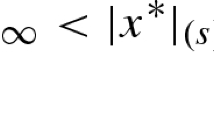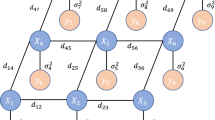Abstract
The paper is concerned with multiobjective sparse optimization problems, i.e. the problem of simultaneously optimizing several objective functions and where one of these functions is the number of the non-zero components (or the \(\ell _0\)-norm) of the solution. We propose to deal with the \(\ell _0\)-norm by means of concave approximations depending on a smoothing parameter. We state some equivalence results between the original nonsmooth problem and the smooth approximated problem. We are thus able to define an algorithm aimed to find sparse solutions and based on the steepest descent framework for smooth multiobjective optimization. The numerical results obtained on a classical application in portfolio selection and comparison with existing codes show the effectiveness of the proposed approach.


Similar content being viewed by others
Notes
A computation of the vector F(x) counts as a single function evaluation. A computation of the gradient vector \(\nabla F(x)\) counts as n function evaluations.
The other algorithms do not provide this functionality.
For the DTS1, DTS2 and DTS3, n is equal to 12, 24, 48, respectively. For the FF datasets, n is equal to 10, 17 and 48, respectively.
The functions are made continuously differentiable by removing the 1/4 roots.
The NOMAD algorithm is not reported since the available implementation does not support problems with more than 2 objectives.
References
Abramson, M.A., Audet, C., Couture, G., Dennis, Jr., J.E., Le Digabel, S., Tribes, C.: The NOMAD project. Software available at https://www.gerad.ca/nomad/
Amaldi, E., Kann, V.: On the approximability of minimizing nonzero variables or unsatisfied relations in linear systems. Theor. Comput. Sci. 209(1–2), 237–260 (1998)
Ansary, M.A.T., Panda, G.: A sequential quadratically constrained quadratic programming technique for a multi-objective optimization problem. Eng. Optim. 51(1), 22–41 (2019)
Beume, N., Naujoks, B., Emmerich, M.: SMS-EMOA: multiobjective selection based on dominated hypervolume. Eur. J. Oper. Res. 181(3), 1653–1669 (2007)
Brito, R.P., Vicente, L.N.: Efficient cardinality/mean-variance portfolios. In: System Modeling and Optimization. Springer Series IFIP Advances in Information and Communication Technology, pp. 52–73. Springer, Berlin (2014)
Cocchi, G., Liuzzi, G., Papini, A., Sciandrone, M.: An implicit filtering algorithm for derivative-free multiobjective optimization with box constraints. Comput. Optim. Appl. 69(2), 267–296 (2018)
Custódio, A.L., Madeira, J.F.A., Vaz, A.I.F., Vicente, L.N.: Direct multisearch for multiobjective optimization. SIAM J. Optim. 21(3), 1109–1140 (2011)
Deb, K., Pratap, A., Agarwal, S., Meyarivan, T.: A fast and elitist multiobjective genetic algorithm: NSGA-II. IEEE Trans. Evol. Comput. 6(2), 182–197 (2002)
Dolan, E.D., Moré, J.J.: Benchmarking optimization software with performance profiles. Math. Program. 91(2), 201–213 (2002)
Ehrgott, M.: Multicriteria Optimization. Springer, Berlin (2005)
El Moudden, M., El Ghali, A.: Multiple reduced gradient method for multiobjective optimization problems. Numer. Algorithms 79(4), 1257–1282 (2018)
El Moudden, M., El Ghali, A.: A new reduced gradient method for solving linearly constrained multiobjective optimization problems. Comput. Optim. Appl. 71(3), 719–741 (2018)
Fan, L., Yoshino, T., Xu, T., Lin, Y., Liu, H.: A novel hybrid algorithm for solving multiobjective optimization problems with engineering applications. Math. Probl. Eng. 2018, 1–15 (2018)
Fazzio, N.S., Schuverdt, M.L.: Convergence analysis of a nonmonotone projected gradient method for multiobjective optimization problems. Optim. Lett. 13, 1365–1379 (2018)
Fliege, J., Svaiter, B.: Steepest descent methods for multicriteria optimization. Math. Methods Oper. Res. 51(3), 479–494 (2000)
Fliege, J., Vaz, A.: A method for constrained multiobjective optimization based on SQP techniques. SIAM J. Optim. 26(4), 2091–2119 (2016)
Fukuda, E.H., Drummond, L.M.G.: A survey on multiobjective descent methods. Pesqui. Oper. 34(3), 585–620 (2014)
Gebken, B., Peitz, S., Dellnitz, M.: A descent method for equality and inequality constrained multiobjective optimization problems. In: Trujillo, L., Schütze, O., Maldonado, Y., Valle, P. (eds.) Numerical and Evolutionary Optimization—NEO 2017, pp. 29–61. Springer, Cham (2019)
Gong, M., Liu, J., Li, H., Cai, Q., Su, L.: A multiobjective sparse feature learning model for deep neural networks. IEEE Trans. Neural Netw. Learn. Syst. 26(12), 3263–3277 (2015)
Li, L., Yao, X., Stolkin, R., Gong, M., He, S.: An evolutionary multiobjective approach to sparse reconstruction. IEEE Trans. Evol. Comput. 18(6), 827–845 (2014)
Liuzzi, G., Lucidi, S., Rinaldi, F.: A derivative-free approach to constrained multiobjective nonsmooth optimization. SIAM J. Optim. 26(4), 2744–2774 (2016)
Lorenzo, D.D., Liuzzi, G., Rinaldi, F., Schoen, F., Sciandrone, M.: A concave optimization-based approach for sparse portfolio selection. Optim. Methods Softw. 27(6), 983–1000 (2012)
Lucambio Pérez, L., Prudente, L.: Nonlinear conjugate gradient methods for vector optimization. SIAM J. Optim. 28(3), 2690–2720 (2018)
MathWorks: MATLAB R2018b Global Optimization Toolbox v4.0. The MathWorks, Natick, MA (2018)
Miettinen, K.: Nonlinear Multiobjective Optimization. International Series in Operations Research & Management Science. Springer, Berlin (1998)
Rinaldi, F., Schoen, F., Sciandrone, M.: Concave programming for minimizing the zero-norm over polyhedral sets. Comput. Optim. Appl. 46(3), 467–486 (2010)
Sinan Hasanoglu, M., Dolen, M.: Multi-objective feasibility enhanced particle swarm optimization. Eng. Optim. 50(12), 2013–2037 (2018)
Wagner, M., Bringmann, K., Friedrich, T., Neumann, F.: Efficient optimization of many objectives by approximation-guided evolution. Eur. J. Oper. Res. 243(2), 465–479 (2015)
Author information
Authors and Affiliations
Corresponding author
Additional information
Publisher's Note
Springer Nature remains neutral with regard to jurisdictional claims in published maps and institutional affiliations.
Rights and permissions
About this article
Cite this article
Cocchi, G., Levato, T., Liuzzi, G. et al. A concave optimization-based approach for sparse multiobjective programming. Optim Lett 14, 535–556 (2020). https://doi.org/10.1007/s11590-019-01506-w
Received:
Accepted:
Published:
Issue Date:
DOI: https://doi.org/10.1007/s11590-019-01506-w




